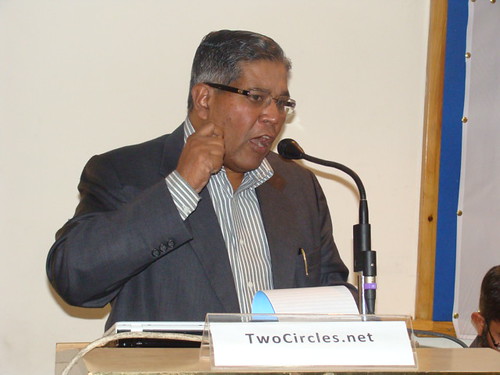By Md. Ali, TwoCircles.net,
New Delhi: The demand and debate over the formation of Indian Wakf Service has generated much heat, facilitating a confrontation between a section of Muslim leaders and the Minister for Minority Affairs Salman Khurshid. But it has taken an interesting turn now, when the chairman of Joint Parliamentary Committee on Wakf, K Rahman Khan has launched a series of veiled criticism of Salman Khursheed and the way Khurshid has handled the Wakf Amendment Bill 2010.
In an interview with TwoCircles.net, KR Khan has suggested that the Central Wakf Council (CWC) should be empowered to have separate cadre of officers for Wakf under its own domain. Khan also criticized the Minister of Minority Affairs, Salman Khurshid’s view that Wakf cadre will lead to ghettoization of Muslim community.

K Rahman Khan
Khan argued for Wakf cadre while talking about the Wakf Amendment Bill 2010. He said that the Bill needs to take several concerns expressed by the Muslim community on board.
Commenting on Sachar’s recommendation of a cadre of officers for Wakf, Rahman Khan said, “This recommendation of the Sachar Committee has to be taken seriously. This (Wakf) requires a special category of tried officers. We have also referred this in our report (JPC report on Wakf)….And we have compared it with Hindu charitable Endowment Act…”
“The Central Wakf Council should think of having, deputing officers of central government, a cadre of IAS officers. Then the CWC can led the services, have its training system. They can recruit people at all India level, train them and send them on deputation to serve in Wakf boards,” said Rahman Khan who is also deputy chairman of Rajya Sabha.
Sachar Committee had recommended the formation of Indian Wakf Service for the proper management of Awkaaf properties across India which is roughly estimated at worth Rs. 120 billion (US$ 26 billion). But the proposal was rejected by the Union Cabinet.
But the demands from the Muslim community for the Wakf cadre became all the shriller after Khurshid’s assertion that separate cadre of officers for Wakf will lead to ghettoization of the community.
“How can it lead to ghettoization? Suppose if you specialize in a particular area, is that ghettoization?” questioned Khan when asked about the possibility of Wakf cadre leading the community towards ghettoization.
During the entire interview Khan maintained a diplomatic stand, preferring not to make a direct comment on Salman Khurshid’s views on the issue but he was also not mincing his words when it came to indirect criticism of the Ministry of Minority Affairs.
“It’s his views on this. I don’t want to comment on the honorable Minister’s views but I think as far as Wakf is concerned today we can’t take Wakf as a small service,” Khan replied when asked to comment on views of Salman Khursheed about the areas of Wakf Amendment Bill 2010, which a section of Muslim community wants to be changed.
KR Khan also said that the JPC report on Wakf under his chairmanship had recommended the government to declare all the Wakf properties across the country as public premises. He highlighted the fact that the Wakf Bill doesn’t address that concern of the JPC.
“The JPC recommends that all the Wakf properties in the country should be declared as public premises but the Bill doesn’t address that…the ministry (of minority affairs) says, ‘let each state declare’. Now why should we depend on the mercy of the state when we can incorporate this into the Bill at the central level?”
Talking about the concerns of the Muslim community regarding several provisions of the Bill, Khan said that the “Bill is with the standing Committee which has received representations from the community and it is expected that it will make changes in the Bill.
Khan said that if required radical changes can’t be ruled out in the Bill.

